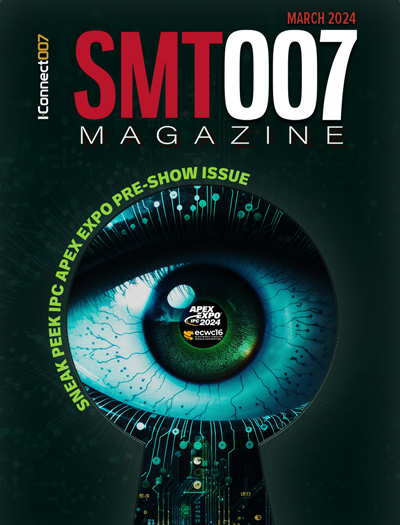-

- News
- Books
Featured Books
- smt007 Magazine
Latest Issues
Current Issue
Box Build
One trend is to add box build and final assembly to your product offering. In this issue, we explore the opportunities and risks of adding system assembly to your service portfolio.

IPC APEX EXPO 2024 Pre-show
This month’s issue devotes its pages to a comprehensive preview of the IPC APEX EXPO 2024 event. Whether your role is technical or business, if you're new-to-the-industry or seasoned veteran, you'll find value throughout this program.

Boost Your Sales
Every part of your business can be evaluated as a process, including your sales funnel. Optimizing your selling process requires a coordinated effort between marketing and sales. In this issue, industry experts in marketing and sales offer their best advice on how to boost your sales efforts.
- Articles
- Columns
Search Console
- Links
- Events
||| MENU - smt007 Magazine
Business Email Compromise: The $43 Billion Scam
August 10, 2022 | Federal Bureau of InvestigationEstimated reading time: 1 minute
Editor’s note: The FBI released this public service announcement, which was an update and companion piece to Business Email Compromise (PSA I-091019-PSA) posted on www.ic3.gov. This PSA includes new Internet Crime Complaint Center complaint information and updated statistics from October 2013 to December 2021.
Business email compromise/email account compromise (BEC/EAC) is a sophisticated scam that targets both businesses and individuals who perform legitimate transfer-of-funds requests.
The scam is frequently carried out when an individual compromises legitimate business or personal email accounts through social engineering or computer intrusion to conduct unauthorized transfers of funds.
The scam is not always associated with a transfer-of-funds request. One variation involves compromising legitimate business email accounts and requesting employees’ Personally Identifiable Information, Wage and Tax Statement (W-2) forms, or even crypto currency wallets.
Statistical Data
The BEC/EAC scam continues to grow and evolve, targeting small local businesses to larger corporations, and personal transactions. Between July 2019 and December 2021, there was a 65% increase in identified global exposed losses, meaning the dollar loss that includes both actual and attempted loss in United States dollars. This increase can be partly attributed to the restrictions placed on normal business practices during the COVID-19 pandemic, which caused more workplaces and individuals to conduct routine business virtually.
The BEC scam has been reported in all 50 states and 177 countries, with over 140 countries receiving fraudulent transfers. Based on the financial data reported to the IC3 for 2021, banks located in Thailand and Hong Kong were the primary international destinations of fraudulent funds. China, which ranked in the top two destinations in previous years, ranked third in 2021, followed by Mexico and Singapore.
To read this entire PSA, which appeared in the July issue of SMT007 Magazine, click here.
Suggested Items
Record Numbers of Exhibitors to Showcase Products and Services at EWPTE 2024
04/25/2024 | IPCWHMA/IPC announces that 215 exhibitors spanning over 50,000 nsf of exhibit space will introduce new product technologies, innovations and demonstrations of the electrical wire harness, wire, coil winding and cable processing industries’ newest advancements at Electrical Wire Processing Technology Expo (EWPTE) to be held at Baird Center May 14-16, 2024, in Milwaukee, Wis. This marks the largest number of exhibiting companies in the event’s history. More than 3,000 attendees are expected to attend this year’s event.
Orbex Secures £16.7m Investment for Rocket ‘Ramp Up’ Period
04/24/2024 | OrbexThe UK spaceflight company Orbex has received £16.7m from six backers in an update to its Series C funding round.
Robin Hayes Selected to Lead Airbus in North America
04/23/2024 | AirbusAirbus SE has announced that C. Jeffrey Knittel is retiring as Chairman and Chief Executive Officer of Airbus Americas, Inc. effective June 3, 2024, after serving as the region’s top executive since 2018. He will remain with Airbus through a transition period. Robin Hayes, former CEO of JetBlue Airways, has been selected to succeed him.
Zentech’s Board of Directors Announces the Return of Matt Turpin as President and CEO
04/22/2024 | Zentech ManufacturingTurpin draws upon over 35 years of experience in the electronics industry and has an 18-year history with Zentech. He previously served as President and CEO from 2006 to 2019 after which time he has remained active in the EMS industry as an advisor to Zentech and other industry organizations.
Altair Acquires Cambridge Semantics, Powering Next-Generation Enterprise Data Fabrics and Generative AI
04/22/2024 | AltairAltair a global leader in computational intelligence, acquired Cambridge Semantics, a modern data fabric provider and creator of one of the industry’s leading analytical graph databases.


